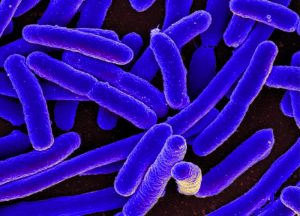The Arkansas Department of Health (ADH) is investigating an outbreak of Shiga toxin-producing E. coli (STEC) infections. Illnesses have been reported among students who attend the University of Arkansas. We are aware of a few hospitalizations related to the outbreak.

The university is working closely with public health officials to help identify the source of the outbreak and provide guidance to help prevent additional infections. At this time, based on what we know about the onset of symptoms, we believe the outbreak started more than a week ago. Most people recover without treatment after 5 to 7 days. At this point, our primary concerns are caring for those who have already been impacted and preventing further spread as the bacteria is transmissible. While surface cleaning and sanitizing protocols are in place at the university, we encourage practicing proper hygiene, especially good handwashing, at all times, on and off campus. Individuals who experience severe E. coli symptoms should seek immediate medical attention (please see recommendations below).
E. coli are a diverse group of bacteria that normally live in the intestines of humans and animals. Although most strains of these bacteria are harmless, some produce toxins that can make you sick, such as Shiga toxin-producing E. coli (STEC). Most people infected with Shiga toxin-producing E. coli experience severe stomach cramps, diarrhea (often bloody), and vomiting. Symptoms usually start 3 to 4 days after swallowing the bacteria. While most recover quickly, some people may develop a type of kidney failure (hemolytic uremic syndrome, also called HUS) and would need to be hospitalized. Antibiotics are not recommended for patients with suspected E. coli infections until diagnostic testing can be performed and E. coli infection is ruled out.
Recommendations for the Public
- Seek medical attention right away if you have any severe E. coli symptoms, including:
- Diarrhea and fever higher than 102°F
-
Diarrhea for more than 3 days that is not improving
-
Bloody diarrhea
-
So much vomiting that you cannot keep liquids down
-
Signs of dehydration, such as decreased urination, dry mouth and throat, dizziness when standing up
-
Practice proper hygiene, especially good handwashing.
-
Practice other general E. coli prevention practices including cooking meats thoroughly; washing fruits and vegetables well under water; avoiding cross contamination; avoiding raw milk, unpasteurized dairy products, and unpasteurized juices; and following the four steps to food safety when preparing food: clean, separate, cook, chill.
- Legionnaires’ Disease Back in the Bronx
- Ukraine: 8 leptospirosis cases being treated at Lviv hospital
- Italy reports 4 local dengue transmissions in August
- Taiwan local dengue cases top 2,000, 2nd death recorded
- Poland: 5th death due to Legionnaires’ disease in Rzeszow
- Las Vegas: Legionnaires’ disease investigations at Caesars Palace and The Orleans Hotel & Casino
- South Carolina: Two horses die from Eastern Equine Encephalitis
- Florida: Suwannee County horse is 11th Eastern Equine Encephalitis case in the state this year


One thought on “University of Arkansas Students Sickened in E. coli outbreak”